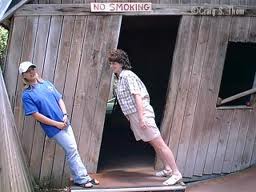These kids come to me and ask, ‘Hey Arnie, are you God?’. I just laugh and say ‘Nice try, but keep looking.‘
— Arnold Schwarzenegger
Buying fixer-upper houses, living in them, repairing them, and eventually renting them out is a safe way to generate short-term income and long-term economic security.
Even Arnold Schwarzenegger, in his new book Total Recall, cites investing in real estate as a valuable step on his road to financial success.
But, how can you be sure that a house is worth what you are offering to pay for it? Based on experience, we can “eyeball” the property and probably be able to make a pretty accurate estimate of its worth, maybe 75% of the time
That’s probably closer to 95% of the time for Arnold, with that Terminator vision of his.
Get a professional inspection
However, that’s not good enough. We need more information than our educated eyeball can provide in order to:
1.) Avoid any surprise defects. After you buy the property, trying to get reimbursed for those defects will be too late.
2.) Negotiate a lower selling price for the house.
I hire a professional inspector to provide me with a complete written inspection report that can be used to negotiate a lower price on the house if it uncovers anything that is in need of repair.
When having the physical inspection done, you should be aware of the most common house problems.
Ten Most Frequent House Problems
A survey of U.S. home inspectors resulted in this list of the most frequently encountered problems:
1.) Improper Surface Grading/Drainage
This is responsible for the most common of household maladies: water penetration of the basement or crawl space.
2.) Improper Electrical Wiring
Includes such situations as insufficient electrical service to the house, inadequate overload protection, and amateur, often dangerous, wiring connections.
3.) Roof Damage
Involves roof leakage, caused by old or damaged shingles or improper flashing.
4.) Heating Systems
Problems in this category include broken or malfunctioning operation controls, blocked chimneys, and unsafe discharge of exhaust.
5.) Poor Overall Maintenance
Includes signs such as cracked, peeling, or dirty painted surfaces, crumbling masonry, makeshift wiring or plumbing, and broken fixtures or appliances.
6.) Structural Problems
Many houses, as a result of problems in one or more of the other categories, sustain damage to such structural components as foundation walls, floor joists, rafters, window and door frames.
7.) Plumbing
Problems consist of the existence of old or incompatible piping materials, as well as faulty fixtures and waste lines.
8.) Exteriors
Flaws in a home’s exterior, including windows, doors, and wall surfaces, are responsible for the discomfort of water and air penetration. Inadequate caulking and/or weather-stripping are the most common culprits.
9.) Poor Ventilation
Perhaps due to overly ambitious efforts to save energy, many home owners have “over-sealed” their homes, resulting in excessive interior moisture. This can cause rotting and premature failure of both structural and non-structural elements.
10.) Miscellaneous
Includes primarily interior components, often cosmetic in nature. May include dents in doors and walls from children’s unsupervised indoor karate practice, or possibly from having Bigfoot (or the Governator) as a former resident. (I inserted those last two examples based on some unfortunate personal experiences I have had.)
A home inspector’s standard practice typically does not include the following, for which a specific license to inspect and identify is required:
- Asbestos
- Radon Gas
- Lead Paint
- Toxic Mold
- Pest Control
If you suspect the presence of any of these items, you would contract with inspectors in these areas independently.
Related Posts
Remove that Garbarge Disposal Now!
6 Steps to Roof Maintenance (for the Home that will Turn Into a Rental House)
How I Evicted A Problem Tenant in 4 Steps
When to Hire a House Inspector – Radio Interview with Rich Peterson
Getting Rid of Bad Tenants
“Turn your home into a rental” on Mark Wayne Show
7 Reasons to Live in a Fixer-Upper House While You Repair It
6 Steps to Roof Maintenance (for the Home that will Turn Into a Rental House)
Our First Rental House Plunge
10 Most Frequent Problems Found by House Inspectors
5 Steps to Get Your House Ready to Rent by Terry Sprouse
5 Steps to take if your house is flooded
Some perfectly legal ways to maximize your rental profits
Add “Start a Rental House Business” to Your Bucket List
The 5 Rules on How to Lose Money and Get Your Rental Property Trashed by Tenants
Window Repair with #2 Son
Required Roof Maintenance for Fixer Upper Houses
Learn to Repair Your Fixer Upper Houses
How I Got Started In Fixer-Upper Houses
How to learn to operate a fixer upper house business
The Peaceful Warrior and Fixer-Upper Houses
Tags: Arnold Schwarzenegger, Arnold Schwarzenegger and real estate investing, excessive interior moisture, faulty fixtures and waste lines, heating system, house inspections, house inspectors, improper electrical wiring, inadequate caulking or weather stripping, incompatible plumbing materials, over sealed homes, poor overall maintence, poor ventilation, roof damage, rotting and premature failure of structural and non structural elements, structural problems, surface granding and drainage, Terry Sprouse, top 10 frequent house problems found by inspectors, Total Recall, value of using house inspectors, written inspection report


Great post Terry.
Folks look at houses and tend to base their decisions on emotions. It is really easy to walk past things that a trained home inspector would catch.
Every investor should at the very least have a detailed inspection sheet that they use when they walk through a house. This is in no way is equal to what a licensed home inspector does, but it will allow you to make some pretty accurate cost estimates so you know whether you want to move forward on the property.
Sharon
Sharon
I really like your idea of taking a detailed inspection sheet to use as you walk through a house. That would be very useful for me to have to remind me of what I should focus on, and to jot notes on about potential repair costs.
Terry – I have that form as one of my “freebies” on my site. You are welcome to look at it and make your own. The forms are in the right sidebar subscription. (Check out my really cool pen that writes “subscribe”. I just love that darn thing).
The inspection sheet is great for not forgetting to look for certain items in a house.
For instance, I would forget about the panel box because it would be hidden behind a piece of furniture or something. Another thing I forgot all the time was to count the windows. If the house needs windows, you are going to need to know how many. I now have “how many” on my sheet. It’s one of the things I don’t want to forget. Since I was in the home inspection business, I know to look for certain basic things and the sheet helps me not to forget any big ticket item. Any investor can learn to do this.
I will be sending you an email.
Sharon,
Thank you for that information.
I just downloaded the property inspection sheet “freebie” from your webpage. That is really a handy little form.
I will take it with me to my next house inspection.
I hope you find it useful. By the way, I sent you an email earlier today.
Nice post! We haven’t gotten into rental properties yet, but even when you’re buying a home to live in you should get an inspection. I have a client that does inspections and he’s extremely anal…thankfully that relates well to being a good inspector. 🙂
Jason,
I think you hit the nail on the head. Your client sounds like he has the perfect personality to be an excellent house inspector. The more anal, the better.
When we bought our house our agent talked us out of leaving a contract after finding problems with the house. The agent said they weren’t too bad. The inspector said we’d be fine and that most of the problems could be easily fixed. However, my gut said it wasn’t okay. Five years later I’m really regretting not going with my gut.
What a mess!
In cases where you haven’t worked with an inspector before, it may be advisable to inspect the inspector. You can request copies of previous inspections that they have done, and contact other recent clients.
I would think in your case, the poor job done by the inspector would make him liable for additional costs that you incurred.
Urgh! What a nightmare! My sister-in-law just bought a new house – at the max of their budget – only to find a tonne of issues, that were slyly hidden, so now they’re seriously cash trapped because of a sub par inspection.
Will keep these saved for when I eventually buy a house….eventually.
That’s a tough situation.
If your sister in law had had a good inspector they probably would have caught those slyly hidden issues. I know inspectors who have been doing inspections for so long that they can sniff out those kinds of tricks.
I think inept inspectors should be taken to court and held liable when they do a sub par inspection.
[…] 10 Most Frequent Problems Found by House Inspectors by Terry @ Fix em Up Rent em Out […]
[…] 10 Most Frequent Problems Found by House Inspectors by Fix ‘Em Up […]
[…] 10 Most Frequent Problems Found by House Inspectors on Fix Em Up Rent Em Out […]
Not wanting to cause a problem here but just so you know, upon using my Google Chrome browser to try to connect to Sharon’s links in the previous comments, I kept getting a red alert warning “Malware Ahead”. Someone might wish to check this out for further confirmation. Thanks.
I still would love to get access to that home inspection sheet that she was referring to.
I have someone working on that now. I have no idea what happened. The forms are in the right side-bar under “subscribe”. I hope my web guy has it finished by morning.
Sharon
I actually saw a funny episode of Modern Family this week about them fighting over whether or not to go into a purchase together of a fixer upper so they could renovate it and turn a profit.
There’s so much work, time, and stress management that goes into properties and dealing with contractors. It is one way to make a lot of money, but I agree with you on hiring a professional inspector and really thinking things through before taking the leap.
[…] 10 Most Frequent Problems Found by House Inspectors by Fix ‘Em Up […]